Таможенный союз
Являясь по сути формой коллективного протекционизма, Таможенный союз представляет из себя объединение трех стран на основе соглашения об отмене на их территории таможенных пошлин. Как вариант межгосударственной интеграции Таможенный союз упрощает торговые транзакции России, Казахстана и Белоруссии и позволяет минимизировать торговые риски, скоординировать национальные законодательства и повысить как эффективность, так и безопасность торговой и промышленной деятельности на территории этого образования.
Как влияет Таможенный союз на систему сертификации
Упразднив на общей территории большинство (кроме антидемпинговых, компенсационных и защитных) экономических ограничений, Таможенный союз дает своим участникам возможность создать единую систему оценки соответствия перемещаемых в границах союза товаров и унифицировать национальные законодательства, повышая тем самым общий уровень качества и безопасности и производимой в ТС продукции, и ввозимой в него. С этой целью специальной комиссией (КТС) регулярно утверждаются новые нормативные акты – технические регламенты, призванные объединить в себе все значимые требования разобщенных национальных стандартов, нередко дублирующих друг друга и/или противоречивых, в едином для всех членов ТС документе. До введения соответствующих ТР Таможенный союз устанавливает Единую форму оценки соответствия нерегламентированной пока продукции по действующим стандартам и нормативам. Централизация требований позволяет добиться большей степени ответственности поставщиков и производителей, в то же время упрощая таможенную сертификацию. Приоритетной формой становится декларация – максимально свободный в оформлении, простой в подготовке, но и самый ответственный (лично) для участников торговой деятельности документ, постепенно вытесняющий привычные для россиян сертификаты. Таможенный союз позволяет повысить общий уровень качества товаров за счет единой для всех формулировки требований к ним.
Какие преимущества дает Таможенный союз своим участникам
В качестве экономического объединения государств, консолидация усилий позволит России, Казахстану и Белоруссии не только упростить таможенные процедуры за счет единого Таможенного кодекса и увеличить свободу передвижений за счет снятия транспортного контроля, но и получить дополнительную прибыль и увеличить (по прогнозам РАН – до 15%) ВВП. Единая же система сертификации позволит поднять престиж и увеличить продажи стран-участниц за счет повышения их безопасности и качества.
Asiantuntijoiden lausunto
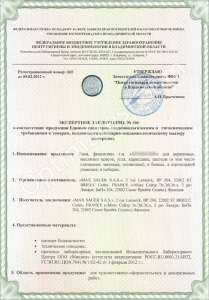 Valtion rekisteröinti (SR) on yksi operaatioista, joka pitää tehdä tuontituotteille Venäjällä. Valtion rekisteröintitodistus myönnetään tämän proseduurin jälkeen ja se arvioi sertifioitujen tuotteiden turvallisuutta. Vain sertifioituja tuotteita voi tuoda maahan ja levittää Venäjällä ja muissa Tulliliiton maissa. SRC oli mahdollista saada toimivan saniteetti-epidemiologisen todistuksen perusteella vähän aikaa sitten. Mutta 1.tammikuuta alkaen kaikki saniteetti-epidemiologiset sertifikaatit on mitätöity. Nykyään SRC voi saada vain asianmukaisten kokeiden jälkeen.
Valtion rekisteröinti (SR) on yksi operaatioista, joka pitää tehdä tuontituotteille Venäjällä. Valtion rekisteröintitodistus myönnetään tämän proseduurin jälkeen ja se arvioi sertifioitujen tuotteiden turvallisuutta. Vain sertifioituja tuotteita voi tuoda maahan ja levittää Venäjällä ja muissa Tulliliiton maissa. SRC oli mahdollista saada toimivan saniteetti-epidemiologisen todistuksen perusteella vähän aikaa sitten. Mutta 1.tammikuuta alkaen kaikki saniteetti-epidemiologiset sertifikaatit on mitätöity. Nykyään SRC voi saada vain asianmukaisten kokeiden jälkeen.
Luettelo tuotteista, jotka tarvitsevat valtion rekisteröintiä, on Tulliliiton Yleisessä Luettelossa, joka tehtiin tuotteiden valikoiman ulkomaiden taloudellisen toiminnan perusteella. Näiden tavaroiden valtion rekisteröinti pitää tehdä ennen yhdenmukaisuusarvioinnin operaatiota. Tuotteille, jotka ei joudu valtion rekisteröintiin, voi liittää kuluttajien oikeuksien suojelun ja terveydenhuollon Venäjän Järjestöllä (Rospotrebnadzorilla) myönnetty kirje, jota voi tarvita asiantuntijoiden raporttia varten.
Tulliliiton laatimassa tuotteiden Yleisessä luettelossa on 2 osaa. Ensimäisessä osassa olevilla tuotteilla pitää ollaa asiantuntijoiden lausunto. Tämä asiakirja on ehdollisesti vapaaehtoinen. Sitä voi saada sellaisia tuotteita varten, jotka eivät joudu valtion rekisteröintiin, tai sellaisessa tilanteessa, kun ei ole selvää, joutuvatko tuotteet valtion rekisteröintiin tai ei. Epäselvässä tilanteessa tuotteet, joita ei ole luettelon toisessa osassa, ovat jotenkin lueteltu tämän asiakirjan kolmannessa osassa. Voitte saada enemmän tietoja tuotteiden turvallisuuden arvioinnin eri tyypeistä (asiantuntijoiden lausunnosta, otsonikerroksen heikentämisen sertifikaatista jne.), jos otatte yhteyttä ROSTESTiin. Se on ilmaista, eikä tarvitse mitään velvollisuuksia.
Venäläinen laki sallii sertifioinnin prosessien suorittamista akkreditoiduilla ulkopuolisilla yrityksillä. Ottakaa yhteyttä ROSTEST sertifiointikeskukseen, jos etsitte laadukkaita ja nopeita palveluja.
Rostekhnadzor License
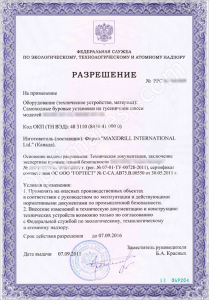
Production certification, which includes certification of the quality management system, certification of equipment, fire safety certification, etc., is a complicated procedure. One of the documents that have to be obtained to lawfully use hazardous and complex equipment is Rostekhnadzor license (license issued by the Federal Service for Ecological, Technological and Nuclear Supervision).
This document is mandatory when it comes to production certification; it must be obtained prior to other conformity assessment procedures. Certification of production, export of equipment and its installation is illegal without Rostekhnadzor license.
Contact ROSTEST certification center to make sure the goods you plan to export are subject to production certification or other forms of conformity assessment.
The problem of certifying hazardous goods prior to export has become urgent as the Technical Regulations on “Equipment and Vehicle Safety” came into force. Installation of hazardous equipment and production certification, as well as export of these goods, is only possible upon proper industrial expert evaluation.
Industrial expert report and Rostekhnadzor license have to be obtained for goods regardless of their origin. The document is valid for 5 years.
Both, industrial expert report and Rostekhnadzor license can be obtained quickly if you delegate the certification process of ROSTEST certification center. Our extensive experience and close connections with local authorities guarantee high quality of services.
Customs Union Certificate
The Customs Union between Russian Federation, Kazakhstan and Belorussia was created in 2010 to eliminate technical and bureaucratic barriers between the three countries when it comes to trade and business. The cooperation between the countries, among other purposes, aims to exclude goods of poor quality from import and export procedures. To achieve this purpose, the Customs Union has developed unified legislation governing certification of goods and services. At the moment (as of April 1st 2012), customs certification of goods that are to be exported or imported within the Customs Union, is performed according to a unified scheme. The certificate issued upon customs certification is also printed on a unified form. Goods that are subject to mandatory certification or declaration are listed in the Common List of Goods compiled by the Customs Union Committee and put into force by Customs Union Committee Decree #319 as of July 18th 2010. The list is based on the Foreign Economic Activity Commodity Nomenclature (FEACN).
Customs certification is mandatory for many goods, the full list of which can be requested from ROSTEST certification center (consultation is free). These goods include but are not limited to: home appliances, light and radio equipment, construction materials, agricultural equipment, kids’ goods, furniture, clocks and watches, dishware and more.
All goods listed in the Common List have to be accompanied by customs certificate, otherwise they can be neither imported not exported from the territory of the Customs Union. The goods are being tested to confirm their conformity with the existing standards that are stipulated either in the unified Technical Regulations, GOST, United Nations Economic Commission for Europe Rules, or other documents. The contents of the certificate is similar to the contents of GOST R certificate and have to include the certification scheme and the name of the certification authority in charge of issuing the document. Customs certification can only be performed upon proper testing of the goods.
The goods that are to be imported, exported, transported, and distributed in the Customs Union have to be marked with the EAC sign.
The advantage of the customs union certificate compared to national conformity certificate is its multi-nationality. The document can be used to import and export goods to all member-countries of the Customs Union. You can delegate the conformity assessment procedure to ROSTEST certification center. Our qualified staff guarantees the high quality of services and prompt certification of goods.
Technical Regulations Certificate
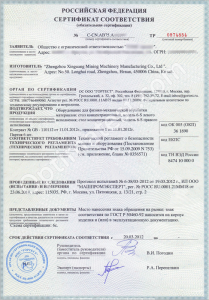 Certification according to Technical Regulations is mandatory not only for goods, but also for various stages of product life-cycle, from production to storage, export, transportation and recycling.
Certification according to Technical Regulations is mandatory not only for goods, but also for various stages of product life-cycle, from production to storage, export, transportation and recycling.
Technical regulations limit export and import of goods that might be harmful for the environment or consumers. Since there are other ways to control the actual quality goods, the state requires manufacturers to confirm the technical safety of goods, which is why Technical Regulations have been developed. Technical Regulations certificate or declaration is mandatory at all stages; this document might be demanded by a number of authorities, including Russian customs. Technical Regulations consist of various standards that can also be found in other regulatory documents like GOST, sanitary standards, etc. Russian customs officers have a full right to request this document from the importer of the exporter of goods provided that the goods are being transported within the boundaries of the Customs Union. Technical Regulations certificate is valid for 5 years and is only issued upon proper testing of goods.
The list of Technical Regulations that have already been put into force and that are still being considered by the Customs Union Commission is available on the official websites of the following authorities: Customs of the Russian Federation, Russian Agency for Health and Consumer Rights, Rosstandart, Customs Union and National Institute for Technical Regulation.
If you want to avoid fines and bureaucracy importing and exporting goods to/from the Customs Union, delegate the procedure of certification to ROSTEST certification center. Our extended experience in conformity will allow you to save time and money.
Fire safety declaration
Fire safety declaration is used as a proof of the goods’ conformity with the fire safety regulations that are stipulated in the Technical Regulations (as of 2009). The same is true for fire safety certificate. These documents are issued by the local department of the Emergency Control Ministry of Russia (EMERCOM) based on the tests performed by the applicant or EMERCOM labs. Fire safety certificate can only be issued based on the official tests by EMERCOM labs, which is evidently due to the area of responsibility. When a fire safety certificate is issued, it is the EMERCOM who is responsible for the information in the certificate, whereas it is the applicant who is responsible for the information in the declaration.
The full list of goods and services that are subject to fire safety conformity with the standards stipulated in the Federal Law on “Technical regulations for fire safety” is available in the Resolution #241 as of 2009. The same Resolution stipulates the procedure of declaration and certification of goods. To learn more about it, please contact ROSTEST certification center, it’s free and there’s no obligation. EMERCOM Decree #91 as of 24.02.2009 also stipulates a list of goods that need to be declared or certified.
Fire safety declaration is used to inform consumers about the fact that the goods meet fire safety regulations. This is why the following parameters are evaluated in the fire safety testing: inflammability, smoke emissions, toxicity level and others.
A full list of Technical regulations, goods’ description, fire safety evaluation and possible damage has to be included in both, fire safety declaration, and fire safety certificate. Fire safety declaration is filled out by the applicant (including the test sheet), unless the process of declaration was delegated to an accredited third party. ROSTEST certification center guarantees high-quality and prompt services.
Fire safety declaration has to be included into the State Registry.
Experts’ Report
 One of the procedures that goods imported and distributed in the Russian Federation are subject to is state registration (SR). State registration certificate is issued upon this procedure and serves as safety evaluation of the certified goods. Only certified goods can be imported and distributed in Russia and in other countries that form the Customs Union. Up until recently, SRC could be obtained based on the valid sanitary and epidemiological certificate. However, as of January 1st all sanitary and epidemiological certificates were voided, and SRC can only be obtained upon proper testing.
One of the procedures that goods imported and distributed in the Russian Federation are subject to is state registration (SR). State registration certificate is issued upon this procedure and serves as safety evaluation of the certified goods. Only certified goods can be imported and distributed in Russia and in other countries that form the Customs Union. Up until recently, SRC could be obtained based on the valid sanitary and epidemiological certificate. However, as of January 1st all sanitary and epidemiological certificates were voided, and SRC can only be obtained upon proper testing.
The list of goods subject to state registration is stimulated in the Common List compiled by the Customs Union on the basis of the Foreign Economic Activity Commodity Nomenclature (FEACN). State registration of these goods has to be performed prior to conformity assessment procedure. Goods that are not subject to state registration might be accompanied by a letter issued by the Russian Agency for Health and Consumer Rights (also known as Rospotrebnadzor) that is sometimes required for experts’ report.
The Common List of goods compiled by Customs Union consists of 2 parts. Goods that are listed in Part I have to be accompanied by experts’ report. This document is conventionally facultative and might be obtained for goods that are not subject to state registration or in a situation when it is unclear whether goods are subject to state registration or not. In an unclear situation, the goods that are not listed in Part II of the Common List are somehow listed in Part III of the document. You can learn more about various types of safety evaluation of goods (experts’ report, ozone-depletion potential certificate, etc.), by contacting ROSTEST. It is free and there isno obligation.
Russian law provides for delegation of certification procedures to an accredited third-party company. Contact ROSTEST certification center if you are looking for high-quality and prompt services.
Our Services
Certification systems are used to prove that the goods meet national and international safety standards, thus meeting the Governmental guarantee to provide Russian customers with safe products only. Even though an international certificate is an advantage, a Russian certificate of conformity is a must for any company willing to export its products onto the territory of Russia. Currently, the reformation of the Russian certification is in place so that soon it becomes similar to the European certification system. However, existing Russian standards as well as standards set by the Customs Union are of the highest priority. For instance, Russian certificate of conformity is used not only to legalize foreign business (such as production, distribution and other import and export businesses), but also to secure consumer rights.
Russian certificate of conformity is used to certify that the goods are ecologically, technologically, chemically, and otherwise safe. The documents might be issued by one of the existing authorities, i.e. Federal Agency for Technical Regulation, Customs Union Commission, or the Emergency Control Ministry of Russia. Russian legislation provides for certification of goods by the exporters themselves as well as by third-party organizations, which is essential when it comes to resolving issues with foreign partners.
Certification centers that have acquired proper accreditation are at an advantage when it comes to dealing with state authorities and local legislation. With ROSTEST, the certification process in any of the existing certification systems (GOST R, ISO, EC, Technical Regulations, etc.) is guaranteed to be quick and smooth. Company experts will help you optimize the number of required tests and documentation by choosing the correct certification scheme, certification form and type of certificate. Certification schemes vary by certificate’s expiration date and price, certification form varies from actual certification to declaration and, finally, certificates may be mandatory and facultative.
Once you decide to start importing or exporting goods to and from Russian, you should understand that Russian certification system has several peculiarities. They include but are not limited to:
Customs Union. In 2012, the Agreement on Sanitary Standards came into force, meaning that goods can be imported and exported only if they have been registered with the state. In case the goods are not included in the list compiled by Customs Union Commission and thus do not require state registration certificate (SRC), they can be accompanied by an exemption letter issued by the Russian Agency for Health and Consumer Rights (also known as Rospotrebnadzor). Goods cannot be imported or exported to or from Russian nor can they be distributed in Russia unless they are accompanied by one of the above-mentioned documents.
-
Certification of hazardous goods and industries (such as oil and gas industry) and certification of potentially harmful goods (such as medical equipment and medications, kids’ goods, foods, etc.). When starting to import goods to Russia, the first thing you need to pay attention to are sanitary standards and documents required as a proof of sanitary safety.
-
The sequence of certification procedures is extremely important particularly for those companies that start manufacturing or importing goods in Russia for the first time. One of the first things you need to do is to apply for state registration certificate (SRC) if is required for the goods you are importing or manufacturing. Certificate of conformity (GOST R or Technical Regulations) and Customs Union certificate can only be applied for by those companies that have already obtained SRC.
Call us, send us an e-mail or see us in the office to get more information about certification process in the Russian Federation. It’s free and there’s no obligation!
State Registration Certificate
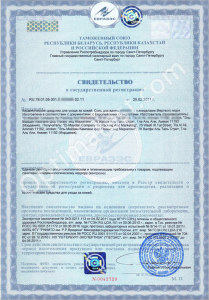
Goods that are required to be registered with the state cannot be imported onto the territory of Russia unless they are accompanied with the SRC. The certificate expires once the production of the imported goods is over and it is no longer imported to the Russian Federation. The state registration procedure as well as the registry maintenance is stipulated in the Common Form.
State registration is mandatory for all goods that are part of the Common List compiled by the Customs Union Commission. It’s essential to note that state registration should be performed prior to other assessment procedures, including conformity assessment, declaration, fire safety assessment, etc. State registration certificates are issued by the Russian Agency for Health and Consumer Rights (also known as Rospotrebnadzor). Goods subject to state registration can be imported into Russia by the manufacturer as well as by third-party importers.
By law, Rospotrebnadzor has 30 days to issue a State Registration Certificate (SRC), meaning you should apply for this document in advance. To speed up this procedure and avoid typical mistakes, contact ROSTEST. It is 100% lawful to delegate the state registration procedure to an accredited certification center.
Exemption letter
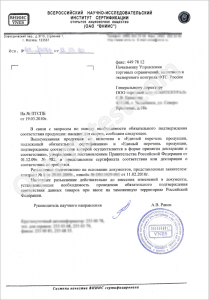 Exemption letters were introduced in the Russian Federation because national certification regulations contradict customs regulations. The former are based on the All-Russian Classification of Products, whereas the latter are based on Foreign Economic Activity Commodity Nomenclature (FEACN). Exemption letters are used to prove that certain goods are legally exempt from certification, meaning they do not require neither certificate of conformity nor declaration of conformity.
Exemption letters were introduced in the Russian Federation because national certification regulations contradict customs regulations. The former are based on the All-Russian Classification of Products, whereas the latter are based on Foreign Economic Activity Commodity Nomenclature (FEACN). Exemption letters are used to prove that certain goods are legally exempt from certification, meaning they do not require neither certificate of conformity nor declaration of conformity.
Russian customs regulations stipulate that exemption letter should be obtained in the following cases:
Fire safety certificate has to be obtained in the first place. In case the goods are not subject to fire safety certification, they have to be accompanied by an exemption letter issued by EMERCOM (Emergency Control Ministry of Russia).
According to Russian customs regulations, exemption letter is required for goods that are not subject to mandatory certification in the GOST R system. This fact can be confirmed by any certification authority, however, Russian customs regulations require that the proof is issued by a single source. Exemption letters issued by VNIIS (National Institute of Scientific Research and Standardization) and VNIIMASH (National Institute of Scientific Research and Standardization in Engineering) are also accepted. Contact ROSTEST certification center to learn more, it’s free!
Usually, exemption letters are valid for 1 year; they can also be issued for a single delivery. The number of goods listed in the letter is unlimited provided that the letter is issued for one applicant.
Under Russian laws, it is totally legal to delegate the certification process to a third-party. Contact ROSTEST to get the exemption letter or any other document required for export quickly and easily.





